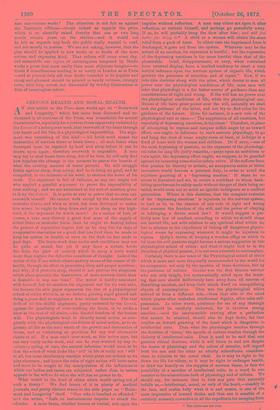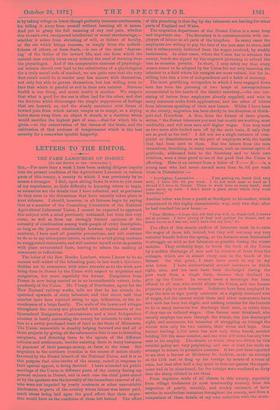NERVOUS HEALTH AND MORAL HEALTH.
AN able article in the Times dome weeks ago on "Brainwork and Longevity," which has since been discussed and re- discussed in all sections of the Press, was remarkable for several characteristics, especially for a curious thesis apparently endorsed by the Lancet of a subsequent week, that overwork of the brain through late hours and the like, is a physiological impossibility. The argu- ment was something of this kind :—All brain-work means the destruction of nervous tissue or brain tissue ; all such Emile when destroyed must be repaired by food and sleep before it can be drawn upon again ; therefore overwork is impossible. A man may try to steal hours from sleep, but if he does, he will only find how hopeless the attempt is the moment he passes the bounds of what the existing amount of tissue permits. He will struggle feebly against sleep, drop asleep, find he is doing no good, and be compelled, in the interests of his work, to shorten the hours of his work. The argument is full of fallacies, as any one might tell who applied a parallel argument to prove the impossibility of over-walking ; and we are astonished at the sort of sanction given to it by the Lancet. It is quite as easy to prove that no man can overwalk himself. He cannot walk except by the destruction of muscular tissue, and when as much has been destroyed as makes him weary, he ought to drop down and go to sleep on the high- road, if the argument be worth much ! As a matter of fact, of course, a man may destroy a great deal more of the supply of either brain or muscular tissue than he ought to destroy before the process of reparation begins, just as he may live for days of comparative starvation on a great deal less food than he needs to keep his system in health, or even on the flesh he has made in past days. The brain-work done under such conditions may not be quite as sound, but yet it may draw a certain hectic fire from the glow of anxiety which to many a taste would more than replace the defective soundness of thought. Indeed the writer of the Times article admits anxiety as one of the causes of ill- health, through its effect in preventing sleep and proper nutrition ; and why, if it prevents sleep, should it not prevent the sleepiness which alone prevents the destruction of more nervous tissue than is desirable at any one time? The writer is hardly consistent with himself, but we mention his argument not for its own sake, but because his able paper represents the rise of a physiological school of ethics which is, as we believe, gaining rapid ground and doing a great deal to supplant a true ethical doctrine. The real drift of all this skilful argument, partly endorsed by the Lancet, against the possibility of over-working the brain, is to strike a blow at the root of all ethics,—the limited freedom of the human will. The physiologists want to identify moral action so com- pletely with the physiological conditions of moral action, as to re- present all life as the mere result of the growth and destruction of tissue, and as containing no provision for any real alternative choice at all. If a man can't over-work, as this writer says, but can very easily under-work, and can be over-worried by any in- voluntary spring of care, the natural inference would seem to be that the secret of what looks like will' in life is really not ' will ' at all, but some involuntary emotion which plays our actions as we play chessmen ; and hence the rules of right action will have more and more to be sought in the manipulation of the influences to which our bodies and tastes are subjected, rather than in useless appeals to the will to do what the will has no power to do.
What would be the kind of ethics which would spring out of such a theory ? We find traces of it in plenty of medical journals, and pretty distinct traces in the able paper on "Brain- work and Longevity" itself. "One who is insulted or offended," said the writer, "feels an instantaneous impulse to attack the offender. A mere brute, whether human or bestial, acts upon the
impulse without reflection. A man may either act upon it after reflection, or restrain himself, and perhaps go peacefully away. If so, he will probably bang the door after him ; and will feel better for doing it A child or a woman will obtain the same relief from a gush of tears. In either case the imprisoned force is discharged, is gone out from the system. Whatever may be the nature of an emotion, its repression is hurtful ; but the repression of the depressing emotions is far more hurtful than that of the pleasurable. Grief, disappointment, or envy, when restrained from external display, have a marked tendency to exert a very hurtful influence upon the nervous system of organic life, which governs the processes of secretion and of repair." Now, if we take this doctrine along with the other, which denies to man all power over the physiological conditions of life, most men will infer that physiology is a far better source of guidance than any considerations of right and wrong. If the will has no power over the physiological conditions of life, while the physiological con- ditions of life have great power over the will, naturally we shall seek the guidance of the latter, and not try to find rules for the guidance of the former. Here, for instance, is a new rule of the physiological sort at once,—, The suppression of all emotions, but especially of depressing emotions, is injurious.' Therefore, in place of attempting to repress and conquer selfish anger by an inward effort, one ought, in deference to one's nervous physiology, to go and bang the door of some empty room at least, or indulge in a flood of tears with the women and children. Or if envy,—one of the most depressing of passions, as the exponent of the physiologi- cal rules for long life justly remarks,—preys upon an ambitious or vain spirit, the depressing effect ought, we suppose, to be guarded against by inventing some similar safety-valve. If the sufferer from that passion be literary or artistic, an anonymous satire or bitter caricature would become a personal duty, in order to avoid the injurious gnawing of a 'depressing emotion.' If there be no access to literature and art, to secure a confidant to whom back- biting speeches can be safely made without danger of their being re- tailed, would seem not so much an ignoble indulgence as a medical precaution. Where is this doctrine, that the complete restraint of the 'depressing emotions' is injurious to the nervous system, to lead us to, in the absence of any code of right and wrong that assumes the freedom of the will, and the power of obeying or infringing a divine moral law? It would suggest a per- fectly new law of conduct, according to which we should shape our inward life, not with relation to any spiritual ideal within us, but in relation to the expediency of letting off dangerous physio- logical steam by expressing whatever it might be injurious to repress. Quilp's device of keeping a wooden effigy on which to let loose his evil passions might become a serious suggestion in this physiological school of ethics ; and what it might lead to in the direction of physical passion, it is not even tolerable to contemplate.
Certainly there is one tenet of the Physiological school of ethics which is more and more frequently recommended to the world for its acceptance, not only by the apostles of these doctrines, but by the partisans of culture. Goethe was the first famous teacher who not only taught, but systematically acted upon the teach- ing that men should deliberately turn away from all sources of disturbing emotion, and keep their minds fixed on tranquillising objects of contemplation. That was the physiological ethics arrived at from a different side,—from that side of the mind which yearns after unshaken intellectual dignity, after calm self- possession. In other words, penitence for sin of any thorough kind should be carefully eschewed, for it involves strong emotion ;—and the inexhaustible craving after a perfection that cannot be attained, should also be kept down, for that implies an inward gnawing of the heart which is dangerous to intellectual calm. Thus what the physiologist reaches through the doctrine of 'tissue,' the apostle of culture reaches through the idolatry of intellectual calm. Does it need to be said that any genuine ethical doctrine, while it will listen to and not despise the lesson of physiology and the callus of serenity, will regard both the one and the other as utterly subordinate considera- tions in relation to the moral ideal. As it may be right to lay down the life for others, so it may be right to endanger health, to draw too heavily on the supplies of nervous tissue, to face the possibility of a sacrifice of intellectual calm, in a word to run counter to the admonitions both of physiology and of culture. We should say, for instance, that to look any pain that naturally befalls us,—intellectual, moral, or only of the heart,—steadily in the face, and realise fully what it is and means, is one of the most imperative of inward duties, and that one is sensible of a certainly unmanly cowardice in all the expedients for escaping from
* The Italics are not ours.
it by taking refuge in lower though perfectly innocent excitements, for hiding it away from oneself without learning all it means. And yet to grasp the full meaning of any real pain, whether -clue to one's own unexpected intellectual or moral shortcomings,— whether it arises from shrinking of will, or failure of faculty, or the sin which brings remorse, or simply from the unfaith- fulness of others, or from death,—is one of the most ' depress- -ing' of the duties of the inward life, and one from which the -natural man usually turns away without the need of warning from the physiologist. And if the comparative clearness of physiologi- cal science should ever lead to the substitution of a physiological for a truly moral code of conduct, we are quite sure that the very *first result would be to render men less sincere with themselves, not only less able to govern themselves, but less willing even to face that which is painful or evil in their own natures. Nervous 'health is one thing, and moral health is another. We suspect -that what is good for the one is often bad for the other, and that the doctrine which discourages the simple suppression of feelings that are beneath us, and the steady encounter with forms of 'inward pain from which nature tempts us to escape, as a shying 'horse starts away from an object it dreads, is a doctrine which would sacrifice the highest part of man,—that for which life is given,—to the conservation of the tissues of the brain, and the cultivation of that coolness of temperament which is the best security for a somewhat ignoble longevity.



































 Previous page
Previous page